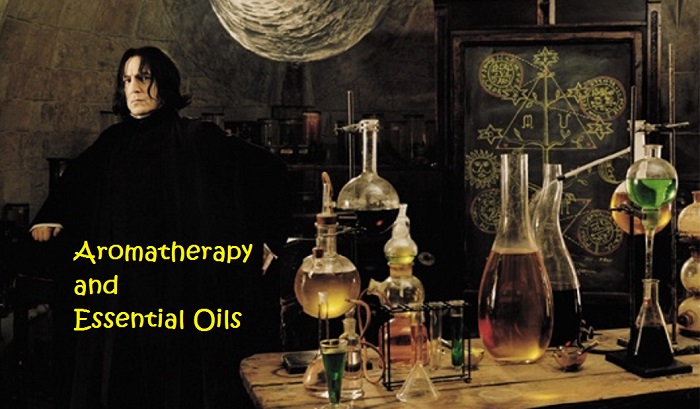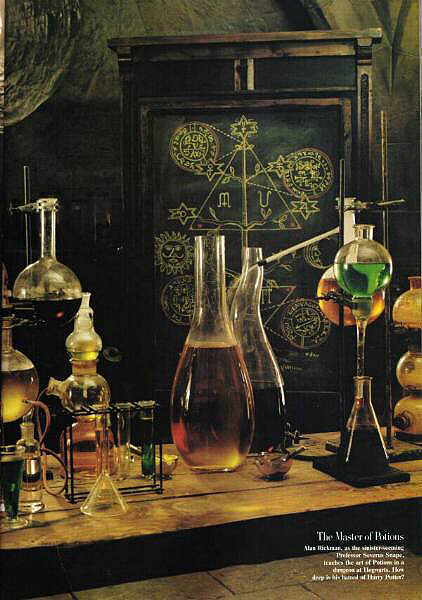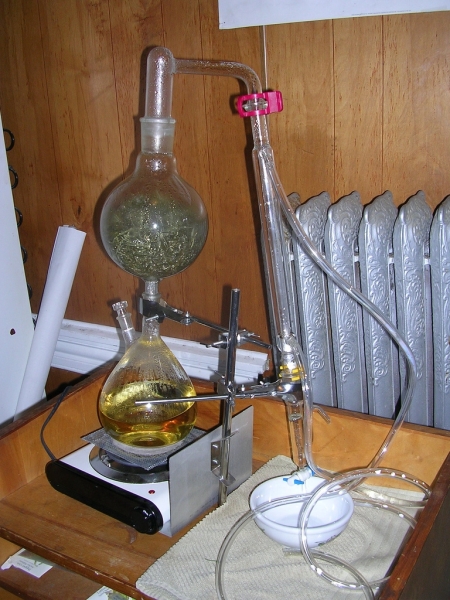

| I have recently become interested in Essential Oils, and Aromatherapy in so far as they are related to Health matters. This interest does NOT include Massage. This subject slowly began to become fascinating after watching Professor Snape in his Potions Lab in the Harry Potter Movies. Now since I clearly have no magic and cannot make the exact same potions, (because I do not have access to the same ingredients, that Snape uses), it took a while to discover that there is a MUGGLE or non-magical version I can still be involved with. Essential Oils. Essential Oils do still have to be distilled in condensers and over flames just as you see in Professor Snapes laboratory. |


| On the left in the above Photo Collage, is the photo labelled The Master of Potions which of course refers to Professor Severus Snape. On the right is a Home Made Distiller used for making Essential Oils. They look very similar, don't they? THIS is what fascinates me about the history, the production and use of Essential Oils. |
| Now whether or not, I will ever have the chance to brew up some Essential Oils for myself, sometime in the future, I have no idea. But in the meantime, I am fascinated with the History and Production of Essential Oils, for which I plan to research and study. |

| The Ebers papyrus was written in Egypt around 1500 BCE - which is roughly around 3500 years ago. However the text of this papyrus may have been copied from earlier sources. This papyrus is one of the oldest medicinal texts ever found and is an extremely important medicinal historical source. This papyrus was named after the man who discovered and purchased it, in the town of Thebes around 1873-74. His name was George Ebers. The Papyrus is now located in the University of Leipzig in Germany. It measures about 20 meters in length and is made up of 110 pages, containing over 700 medicinal remedies and "magical" formulae. When the tomb of Tutankhamen was opened in 1922, it was found to contain jars of essential oils. Some of the remedies evident in ancient Egypt are still used today. For Example... Mint – it was believed to cure bad breath and even today we still eat mints to stop bad breath. Honey – it was believed to cure sore throats and even today we still make cold remedies with honey. A spoonful of honey, some lemon juice and hot water mixed together, all help soothe the throat. Aloe Vera was believed to cure burns and today in many people’s gardens an Aloe Vera plant is always ready to be used to rub over sunburns. Ginger is an excellent remedy for nausea. However, ginger was not known in ancient Egypt. It was first discovered in China and Indonesia (the Spice Islands) during the medieval age of exploration. Long after the Ancient Egyptian civilization had disappeared. Historical Sources for the above details. History of Medicine Ebers Papyrus - Wikipedia Ginger on Wikipedia |